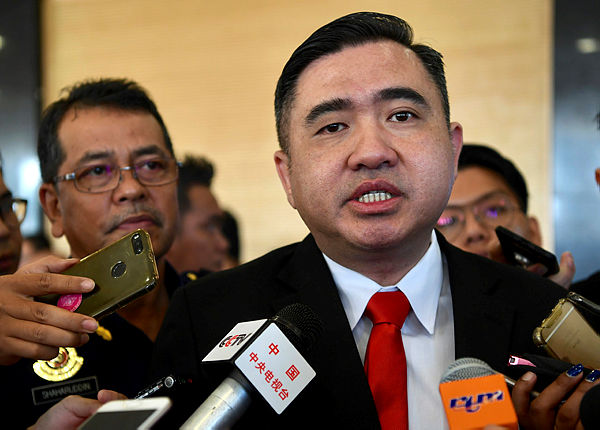PUTRAJAYA: Two air traffic controllers on duty during the fatal accident at the Sultan Abdul Aziz Shah Airport’s runway in Subang on March 18 have been suspended pending investigations, according to Transport Minister Anthony Loke Siew Fook.
The two experienced traffic controllers were on duty in shift two and shift three on the day, he said.
“Their action, logbooks of all the things transpired in air traffic control (ATC) will be investigated internally by the CAAM (Civil Aviation Authority of Malaysia),“ he said in a press conference on the preliminary report of the incident by the Air Accident Investigation Bureau (AAIB), here today.
In the 3.20am incident, Mohd Ruzaimi Iskandar Ahmad Razali, 39, the driver of a vehicle used to supervise maintenance work on the runway was seriously injured after it was involved in an accident with a private aircraft. He died at the Sungai Buloh Hospital at 6.45pm on March 19.
According to the report, Loke said on the day of the incident, the duty air traffic controller (shift two), allowed a vehicle to enter the threshold area of Runway 15 area at 12.50am for lighting maintenance work.
Subsequently at 1am, Loke said two vehicles comprising an escort vehicle driven by the victim and a maintenance vehicle carrying three contractor workers for runway centreline painting work were allowed by the controller to enter the runway via threshold runway 15 to carry out the painting works.
At 2.15am, the controller received a request from the lighting maintenance vehicle to vacate the runway.
“Based on this last communication, the controller (shift two) recorded in the tower logbook that maintenance works on the runway had been completed and all vehicles had vacated the runway despite there being two other vehicles still on the runway doing painting works,“ he said.
According to the report, he said the contractor workers doing the painting works started painting the runway centreline from threshold runway 15 and moved towards threshold runway 33.
While the contractor’s vehicle moved along the centreline and was followed closely by the victim’s vehicle but for no apparent reason, the victim’s vehicle was left behind and remained static as far as approximately 30m, he said.
According to the report, Loke said the controller on duty (shift two) handed over his shift at 3am to another controller (shift three) with the information that no more work on the runway was recorded in the log book.
Loke said the private aircraft, with a total of 12 persons on board from Jaipur, India, was cleared for landing after the controller (shift three) was satisfied that the runway was clear.
Loke said when the contractor’s workers saw the landing light of the aircraft approaching, all three of them boarded their vehicle and drove away from the runway.
“While making a 180-degree turn, the driver realised the escorting (victim) vehicle was still static at the same last position. Based on witness statements, they flashed the headlight of the vehicle several times to attract the escort vehicle attention.
“No response was observed from the escort (victim) vehicle, and as the aircraft was getting closer to them, the driver (contractor’s vehicle) drove his vehicle away from the runway,“ he said.
Based on Cockpit Voice Recorder (CVR) information, the report said the aircraft crew exclaimed “we hit something” and did not suggest what really happened to the aircraft.
Upon inspection of the wing of the aircraft, the leading edge of the port wing were severely damaged with the metal parts sticking to the roof of the victim’s vehicle, Loke said.
Asked whether the victim was asleep, Loke said the driver’s seat was reclined backwards, however investigators had not come to any conclusion.
Asked whether the beacon on the escort’s vehicle was activated during the incident, he said the specialists were still analysing the CCTV footage of the incident.
“Because it (footage) looked very pale. We can’t determine whether it was put on or not fitted because the whole (vehicle’s) roof was gone,“ he said.
To prevent such an incident from occuring in the future, Loke said the AAIB would further investigate the application of single controller per shift system after midnight until 6.30am.
Loke said a thorough investigation would also be conducted on the standard operation procedure (SOP) for communications between the control tower and maintenance vehicle using walkie-talkie instead of very high frequency (VHF) radio communication.
He said an in-depth investigation on the SOP for vehicles operating on the runway would be conducted especially on special equipment that need to be in the vehicle. — Bernama













